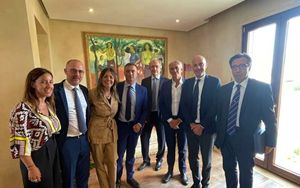(Finance) – “United for legality is an opportunity to represent the daily work carried out by chartered accountants to politicians and magistrates. We want to keep the attention of public opinion high with respect to this issue which also closely concerns the judicial sphere “, convinced that the work of professionals is underestimated compared to the real value in the economic and fiscal scenario. Confiscated assets should be immediately relocated and returned to the community, but first of all we need to help companies that risk being approached by organized crime”. She said it Matteo De Lise, president of the national union of young accountants and accounting experts, on the sidelines of the third edition of the “United for legality” event organized by UNGDCEC at the Port of Rome in Ostia.
The “United for legality 2023” prize was awarded to the Minister of Justice Carlo Nordio. “An acknowledgment – says De Lise – which also represents a wish: we need to keep the spotlight on a category that is a bulwark of justice and legality, but which needs greater guarantees to operate in an increasingly complicated context”.
Other awards for legality have been awarded to Donato Pezzuto, Administrator and Judicial Guardian of the Port of Rome, Massimiliano Monnanni, President of the Public Company of Services to the Person Asilo Savoia, and to Renato Marconi, Managing Director of Marina di Procida Spa, present in Ostia. And to Nicola Gratteri, attorney of Catanzaro, and Brunello Cucinellistylist and entrepreneur, who will receive them in the coming weeks.
He attended the event Francesco Paolo Sisto, Deputy Minister of Justicewho announced an intervention by the Government: “We need to limit the anti-mafia disqualifications against companies and it is possible to do this thanks to self-control. In the new course we are thinking about there is a professional dedicated to this process of self-control, who will serve to recover the dialogue between public and private. We want to defeat the presumption of illegality and try to design together paths suitable for achieving the goal of a healthy state from a juridical and ethical point of view”.
“Deputy Minister Sisto’s message gives companies great confidence and marks an important demarcation line: the company is ethical if it pursues its core business”, analyzes De Lise. “Now the professionals close to the companies will bring this message to their clients, reminding them that the correctness of the organizational system of the companies represents the real prevention against the infiltration of organized crime in the activities”.
During the event, which took place at the Port of Rome in Ostia, two round tables were held on “Anti-Mafia Interdictions and Judicial Control” and “The company: business ethics and Organizational Models pursuant to Legislative Decree Lgs. n. 231/2001”, moderated by Sonia Mazzucco, vice president of UNGDCEC and delegate for Economic Criminal Law: “Never miss an opportunity to communicate important messages such as legality. We, as professionals, are always first line on these aspects and we carry on our profession with passion and dedication, often even exposing ourselves personally”.
Among others, he also spoke at the conference Guglielmo Muntori, president of the Observatory on the policies for combating economic crime of the Rome Chamber of Commerce, former President of the Prevention Measures Section of the Court of Rome: “Recently a tire depot was transformed into a gym and is welcoming over a thousand young people from the area, who were previously forced to attend those of the Spada, sports centers that were actually recruiting centers”.
“They were difficult moments – ha said Pezzuto – as we faced a bankruptcy situation where crime was rampant. The tenants of the port themselves were unsavory subjects and even the security was headed by a drug trafficker. A very difficult context, where there are now principals of all the forces of order. So we bet on sport to relaunch Porto. Another highlight is the transformation of an abusive tire depot into a gymnasium of legality”.
“No goal can be achieved without networking – ha said Monnanni – and it is impossible to transform a confiscated asset into a social enterprise. Today we are a model that manages 11 assets and employs many young people. A model that we offer to the territory: judicial administrators are not left alone in the management of assets, but are also supported by public bodies”.
Among the virtuous examples there is also the port of Procida: “The tourist ports – ha highlighted Marconi – they are a frontier and we often find ourselves dealing with crimes of all kinds, from drug trafficking to tax evasion, and decent people must defend themselves from both land and sea. Ethical management bears fruit and Procida is an incentive to always be careful”.
